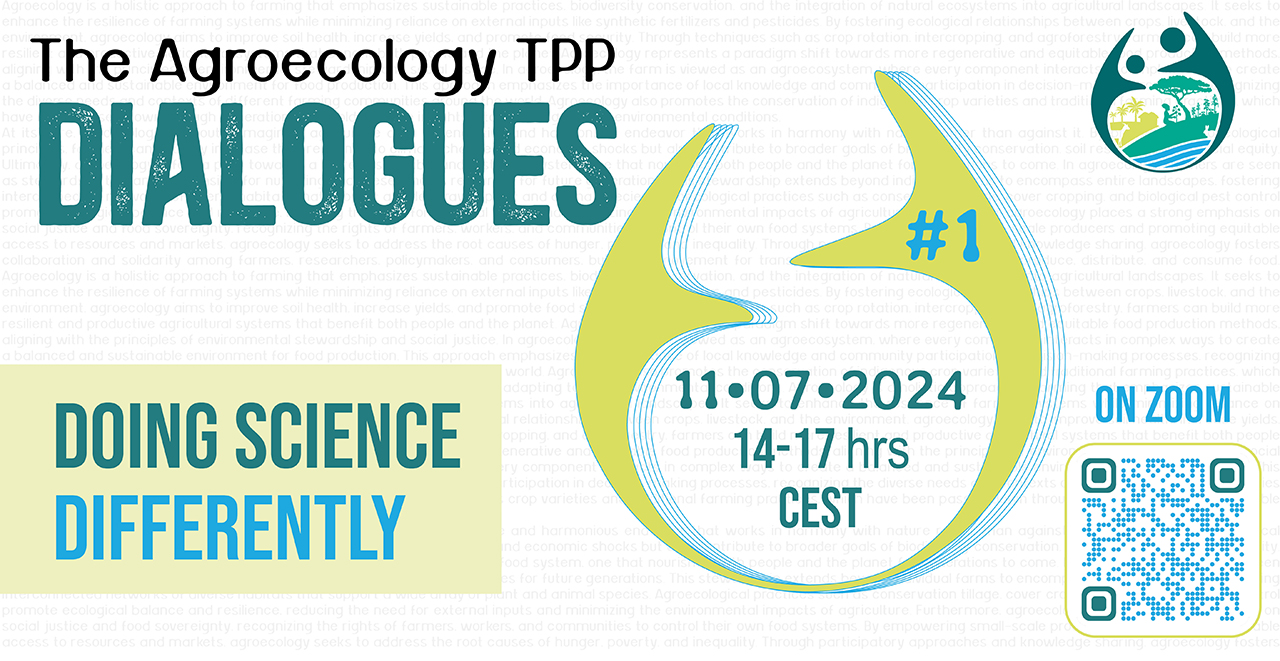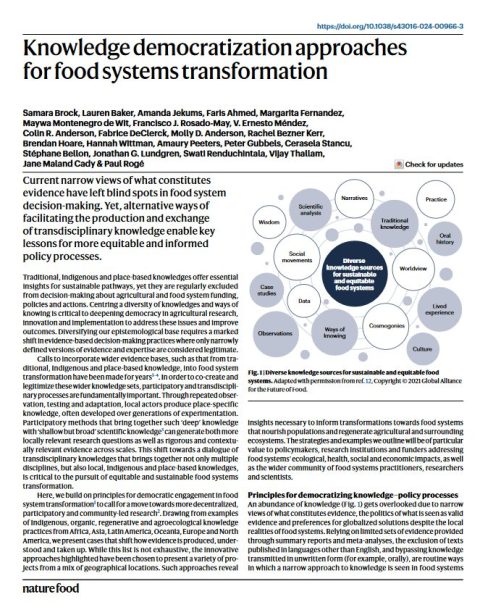the first Dialogue started from the HLPE definition of transdisciplinary science (HLPE, 2019, p.33) and analyze both challenges and best practices from a suite of Agroecology TPP's projects on doing science differently.
Organised by The Transformative Partnership Platform on Agroecology
- Bernard Triomphe, AE-TPP Co-convenor and System Agronomist, CIRAD
- Michael Hauser, Senior Associate, CIFOR-ICRAF and BOKU University, Austria - Keynote speech -Transdisciplinary science: what is it and how to facilitate it?
Reflection on the keynote speech
- Brigid Letty, Prolinnova and Principle Scientist, Institute of Natural Resources (INR) in KwaZulu-Natal, South Africa
- Francisco Rosado-May, Rector, Universidad Intercultural Maya de Quintana Roo
- Jane Maland Cady, Program Director, Global Collaboration for Resilient Food Systems, McKnight Foundation
- Lauren Baker, Deputy Director, Global Alliance for the Future of Food
- Lilian Beck, Agroecology Extension Specialist, Institute for Social Sciences of Agriculture - University of Hohenheim, Germany
Project presentations with a focus on innovation, methodology, results and co-creation
- CGIAR Agroecology Initiative: Bernard Triomphe, AE-TPP Co-convenor and System Agronomist
- Foresight: Marie de Lattre-Gasquet, Researcher, CIRAD
- Agrofor: Valentina Robiglio, Senior Land Use Systems Scientist, CIFOR-ICRAF
- ABCD-VIPPT: Lisa Fuchs, Scientist, Alliance of Bioversity International - CIAT
The group discussion focused on excellencies, missed opportunities & way forward.
Resources
A two-page summary of the transdisciplinary research and an indicator framework for assessing transdisciplinary agroecology - this will form the discussions during the workshopA suggested further reading list if you are interested in learning more about the topic:
- HLPE (2019). Agroecological and other innovative approaches for sustainable agriculture and food systems that enhance food security and nutrition. A report by the High Level Panel of Experts on Food Security and Nutrition of the Committee on World Food Security, Rome.
- Maughan C and Anderson CR (2023). A shared human endeavor”: farmer participation and knowledge co-production in agroecological research. Frontiers in Sustainable Food Systems, Vol 7. https://doi.org/10.3389/fsufs.2023.1162658
- Sinclair, F and Coe R (2019). The options by context approach: a paradigm shift in agronomy. Experimental Agriculture 55 (S1): 1–13. https://doi.org/10.1017/S0014479719000139
- Brock, S., Baker, L., Jekums, A. et al. Knowledge democratization approaches for food systems
transformation. Nat Food 5, 342–345 (2024).
The principles outlined in the article emphasize the importance of epistemic justice, intercultural co-creation, and knowledge mutualism and exchange in democratizing knowledge-policy processes. These principles, the authors argue, are essential for addressing biases and empowering marginalized communities in shaping food system transformations.
Led by Samara Brock from Yale University, the article is an outcome of an international process convened by the Global Alliance for the Future of Food on the Politics of Knowledge that brought together food systems leaders to strategize on advancing research and evidence for agroecology. Drawing from case studies worldwide, the authors highlight innovative approaches that involve local actors in knowledge production and exchange.
Featured as a key model in the report are farmer research networks supported by McKnight’s Global Collaboration for Resilient Food Systems, which combine scientific knowledge with Indigenous traditional and local knowledge in communities of practice that span ten countries in the high Andes and Africa. These networks bring together farmers, research institutions, development organizations and others to improve agriculture and food systems for all.
The authors recommend a.o. to support research that focuses on system-wide change, rather than on narrowly defined quantitative criteria such as, for example, agricultural yields. This will entail looking beyond what is easily quantifiable to incorporate broader social, cultural and ecological drivers and consequences.



No comments:
Post a Comment